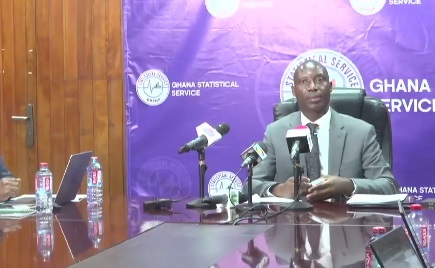Ghana’s year-on-year inflation eased further to 11.5 per cent in August 2025, down from 12.1 per cent in July, according to the latest figures released by the Ghana Statistical Service (GSS).
This marks the eighth consecutive month of decline and brings inflation below the government’s end-of-year target of 11.9 per cent.
The August figure is also the lowest recorded since October 2021, highlighting the progress made in stabilising prices after inflation peaked at nearly 24 per cent in December 2024.
“On the average, prices of goods and services rose by 11.5 per cent between August 2024 and August 2025,” said Dr. Alhassan Iddrisu, Government Statistician, when presenting the report on Wednesday, September 3, 2025.
“The pressures that had been driving inflation in recent months are clearly easing.”
Month-on-month, overall prices fell by 1.3 per cent, providing some relief for households after years of rising living costs.
Food and non-food prices ease
Food inflation, which has been the biggest driver of consumer prices, declined to 14.8 per cent in August from 15.1 per cent in July, with food prices dropping by 2.5 per cent in one month. Non-food inflation also moderated, slowing to 8.7 per cent from 9.5 per cent over the same period, with a marginal 0.1 per cent fall in non-food prices.
Inflation for goods stood at 13.9 per cent, compared with 14.2 per cent in July, as goods prices dropped by 1.6 per cent. Meanwhile, inflation for locally produced items was 12.2 per cent, higher than the 9.5 per cent recorded for imports. The sharper decline in imported inflation was attributed to a stronger cedi and easing global cost pressures.
Regional variations
Despite the national slowdown, inflation remains uneven across the country. The Upper West Region posted the highest regional rate at 21.8 per cent, nearly double the national average, though lower than July’s 24.8 per cent. In contrast, the Bono Region recorded the lowest inflation at 6.1 per cent, highlighting significant disparities in price stability across regions.
According to the GSS, these regional differences are driven by variations in food supply, transportation costs, and market access.
Policy implications
The sustained decline in inflation is being touted as evidence that Ghana’s economic stabilisation programme is delivering results. From 23.8 per cent in December 2024 to 11.5 per cent in August 2025, inflation has dropped by more than 12 percentage points in just eight months.
The Government Statistician stated that the trend presents an opportunity for households to “save more and shop smarter,” while urging businesses to take advantage of the lower inflation environment to expand investments. For government, the agency recommended locking in the gains through fiscal discipline and stronger local supply chains.
